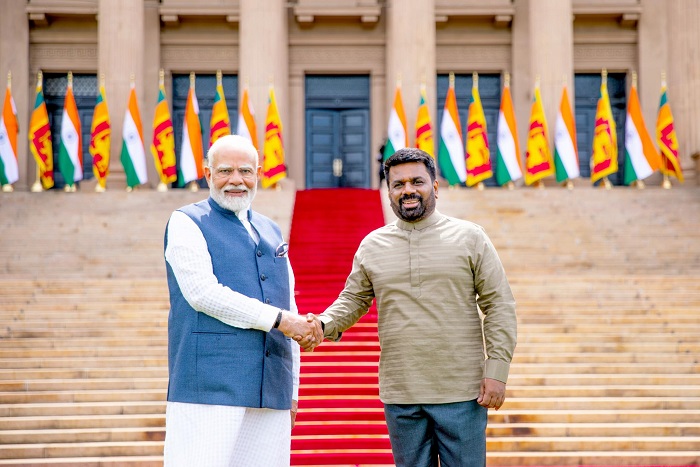-By LeN Political Affairs Correspondent

(Lanka-e-News -05.April.2025, 11.10 PM) In a world increasingly defined by border disputes, data leaks, and diplomatic cold shoulders, there’s something comfortingly vintage about two world leaders sitting down to discuss—among other things—fish.
Indian Prime Minister Narendra Modi and Sri Lankan President Anura Kumara Dissanayake did just that in Colombo this week, in a meeting that covered everything from solar panels to stolen tuna. It was, in diplomatic terms, a smorgasbord—served with a side of symbolism and seasoned generously with Memorandums of Understanding (MoUs), the modern equivalent of pinky promises, only with better stationery.
The leaders signed seven MoUs, including one to develop Trincomalee as an energy hub. Another will enable Sri Lanka to export electricity to India—assuming, of course, that the island’s famed power cuts don’t get there first.
Modi, no stranger to poetic turns at the podium, quoted Tamil sage Thiruvalluvar: “What could be bigger protection against the enemy if not the shield of a true friend?” A fine sentiment, although in geopolitics, the answer is usually “a bigger navy.”
Still, symbolism mattered. Dissanayake made India his first foreign stop after assuming office, and Modi has now returned the favor. That’s not just diplomatic etiquette—it’s international bromance, and both sides are playing the part. Picture two seasoned politicians exchanging friendship bracelets made of strategic fuel reserves and fibre-optic cables.
The highlight, however, was the perennial and unsinkable issue of fishermen. It appears that while nations can build pipelines and share solar energy, they still struggle to divide the sea without someone’s net crossing an invisible line. Both leaders agreed to a “humanitarian approach”—which sounds lovely, until one remembers that “humanitarian approach” in political speak often means “let’s keep talking and hope the fish swim somewhere else.”
Still, hope floats. President Dissanayake reaffirmed that Sri Lanka would not allow its territory to be used “inimically” against India—a word that surely caused several spell-checkers to short-circuit. It was a classic diplomatic assurance, short of naming names but long enough to calm nerves in New Delhi.
And speaking of nerves, Modi gently nudged Colombo on Tamil reconciliation, constitutional implementation, and those elusive provincial council elections. The message was clear: energy projects may run on fuel, but regional harmony still runs on promises kept.
With the Neighbourhood First Policy and the increasingly acronym-loving SAGAR vision steering India’s regional agenda, Sri Lanka remains a key player. After all, it’s not every day that one’s neighbour offers oil pipelines and polite constitutional reminders in the same breath.
In conclusion, while Modi and Dissanayake’s meeting was draped in protocol and paved with pledges, it left the unmistakable scent of a pragmatic partnership—one that understands the value of friendship, the weight of history, and the diplomatic complexity of who gets to cast the first net.
Because in South Asia, as in life, it turns out everything is about lines—those you cross, those you draw, and those you negotiate over, again and again, ideally with fish curry on the menu.
-By LeN Political Affairs Correspondent
---------------------------
by (2025-04-05 17:34:34)
Leave a Reply